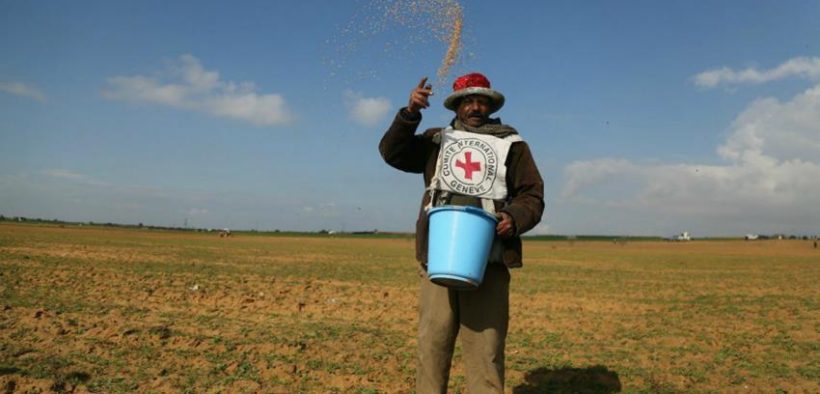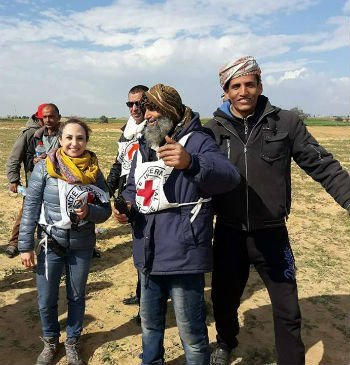Gaza Farmers Celebrate Access to Harvesting Farm Lands

Gazan farmers till the soil again with the help of the International Committee of the Red Cross.
In April 2018 Palestinian farmers resumed cultivating lands the 2007 Israeli-blockage formerly prohibited, thanks to a Red Cross project.
Mahmoud Abu Snaima shed tears as he and more than 200 other farmers started to once again sow wheat seeds on the farmland, just outside the village of Shuka near the southern Gaza Strip city of Rafah, right alongside the border with Israel.
It’s the first time Abu Snaima and his neighbors have been able to work the land in the past 12 years. In 2006, the farmers of Shuka were forced to abandon the land after the Israeli army invaded the 14,000-resident village along with other nearby border areas in accordance with an Egypt-Israel agreement. The Israeli army destroyed the brothers’ crops, water management systems and greenhouses, worth an estimated $300,000.
The International Committee of the Red Cross (ICRC) in Gaza supported an initiative to help the farmers with the cultivation.
“As you see, in this area, which is very close to the Israeli barbed wire fence, my four brothers and I own land of around 17 acres, but this is the first time that we are able to reach it in the past 12 years,” said 47-year-old Abu Snaima to Citizen Truth. “Thanks should go to the ICRC, who came over our region and began combing the land, enabling us to start cultivating, while dressed in vests labelled with the red cross.”
Abu Snaima and his brothers have had it tough since being forced off the land. They could only cultivate a small area, 500 meters from a 300-meter buffer zone cut by Israeli military bulldozers into the narrow Palestinian strip along the border.

Mahmoud Abu Snaima, celebrates returning to his farmland that his family has worked for generations. (Photo: Rami Almeghari)
“In fact, over the past several years…in the Shuka village in particular, we have been able to plant some crops, mainly beans. In times of tension, we flee the land, while in times of calm, we keep working. One of our main concerns here is the shortage of water, and sometimes, like last year, we lose almost half of our produce,” Abu Snaima explained.
Another farmer from Shuka, 58-year-old Mohammad Abu Khaled, also returned to border farmland with the help of the Red Cross.
“Actually, we plant and we cannot expect to harvest the crop. We plant today, and we cannot expect we will return to it the next day, due to the current political circumstances,” he told Citizen Truth. “We call on the concerned parties to help farmers remain steadfast on their farmlands…,” he added.
Hardships
Shuka’s local agricultural committee spoke of many hardships faced by farmers whose families have for generations owned the land along the border. The Isreali blockade includes a continuing land, air and sea barrier of the Gaza Strip, which Israel and Egypt agreed on in 2007 when Hamas took control of the Gaza Strip during the Battle of Gaza, seizing government institutions and replacing Fatah, another Palestinian faction, and other Palestinian Authority officials with Hamas members.
“The village suffers from a shortage of irrigation water, which is now coming mainly from the Jargoun private-owned water well, pumped via pipelines, through the western parts to the eastern parts,” Ameer Abu Snaima, a local agricultural official, revealed.
The ICRC’s intervention has allowed these farmers to regain access to 200 meter-wide fields stretching about six kilometers along the boundaries of Shuka village and a further three kilometers outside the nearby village of Fukhari.
Highway to the Buffer Zone
Over the past three years, the Red Cross has launched several small projects to help Gaza Strip farmers. These include paving 12 kilometers of agricultural roads, rehabilitating 540 acres of farmland, sponsoring the purchase of a variety of seeds, the construction of 100 irrigation pools and restoring 200 greenhouses.
After sowing the seeds, the farmers don’t need to go regularly to the area. What they need is facilitation again y the ICRC at the harvest season.
“It’s a facilitation, it’s bilateral talks between the ICRC and the Palestinian and Israeli authorities. At the end, what makes the difference in the lives of these farmers is to reach this, and this what we want,” the ICRC’s Suhair Zaqout said to Citizen Truth at her Gaza City office.
“The type of crops are rain-fed crops, which means after sowing the seeds, the farmers don’t need to go regularly to the area. They need again facilitation by the ICRC at the harvest season, which is expected at the end of April, beginning of May,” she explained.
“Our main concern is to continue farming our ancestors’ farmlands, without any interruptions,” said Mahmoud Abu Snaima. “We have nothing to do but farming, which enables us and our families to get by and to live with dignity.”
















Isreal is wrong, what they’re doing to Palestine people?
These farm fields should be burned, unless the Gaza terrorists stop burning Israeli fields.